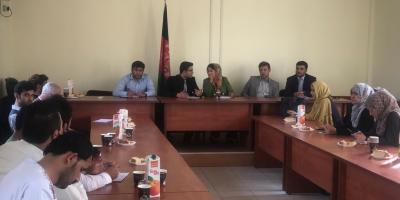
Just one year after IDLO first helped the Afghanistan Attorney-General’s Office (AGO) develop and launch a specialized database to track violence against women cases, the system has transformed the AGO’s ability to generate accurate statistics and produce detailed assessment reports.
Use of the ‘Elimination of Violence Against Women (EVAW)’ database has grown substantially since it was first introduced. To date, almost 10,000 cases from 23 out of 34 Afghan provinces have been entered into the online system.
The database has facilitated the AGO’s task of generating assessment reports on a range of topics. Standard reports analyze the number of registered cases by province, date range or crime type. Others focus on referral statistics, to determine which government department or agency has referred what percentage of cases for prosecution. Reports also review data on the decisions made by each type of court (Primary, Appeal or Supreme) by province and date range.
The database is the only source of transparent data for statistics on violence against women cases
“The database is the only source of transparent data for statistics on violence against women cases,” said Ibrahim Khail, Head of the AGO Policy and Planning Department, during a coordination meeting in Kabul to mark the one-year anniversary of the launch.
Significantly, these reports often inform the work of other Afghan government offices and ministries. For instance, ‘defendant reports’ – which detail personal information about a defendant and their family as well as prior convictions for violence against women crimes – are used by the Ministry of the Interior to determine whether an Afghan citizen qualifies for a passport.
Furthermore, the database enables the AGO to track case-flow and thus supervise the performance of its employees. Managers can determine each individual prosecutor’s conviction, acquittal, reversal, rejections and dismissal rates, allowing them to quickly identify patterns regarding training needs or case load. If a trial prosecutor has a low conviction rate for a particular crime, a manager may discuss with him whether additional training is required. If a prosecutor has a higher-than-average tendency to encourage dispute resolution, their case load may be reviewed to ensure they are able to spend sufficient time on each case.
Managers can also check whether administrative staff are entering data into the system accurately and in a timely manner, the importance of which was underlined at the coordination meeting. “It is the ethical duty of assigned staff to enter and update these cases regularly,” said Ms. Parveen Rahimi, Director of the Kabul EVAW Unit. As a result, starting in 2018 the terms of reference of AGO administrative staff will be revised to include entering and updating case information in the EVAW database.
Most recently, IDLO has helped the AGO implement a modification of the EVAW database to build up a separate juvenile database, which already contains over 70 juvenile cases for offences including theft, assault and battery, moral crimes, forgery, possession of narcotics, attempted rape, and carrying a gun without a license, amongst others.
At the coordination meeting, Ms. Rahimi thanked IDLO for its continued support and collaboration. Under the umbrella of the Supporting Access to Justice in Afghanistan (SAJA) program, supported by the United States Department of State, IDLO has been working with the AGO since 2013 to increase the effectiveness of EVAW Units in prosecuting violence against women cases.
Image credit: AGO administrative professionals from 15 Afghan provinces attended the IDLO-AGO coordination meeting in Kabul to mark the one-year launch of the EVAW database.

